| | | OFFLINE | | Post: 18.524
Post: 1.177 | Registrato il: 28/08/2005
Registrato il: 20/01/2009 | Administratore | Utente Veteran | |
|
 GENERAL AUDIENCE TODAY
GENERAL AUDIENCE TODAY
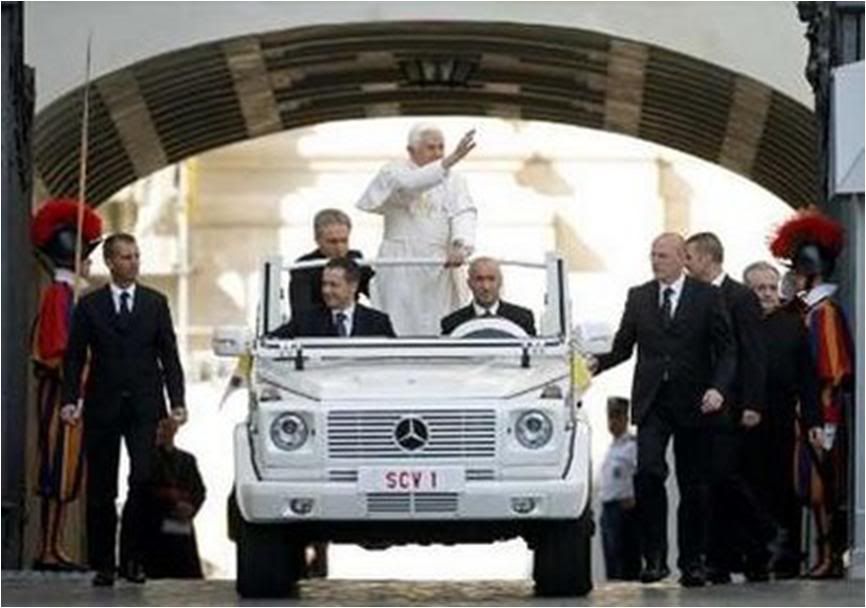

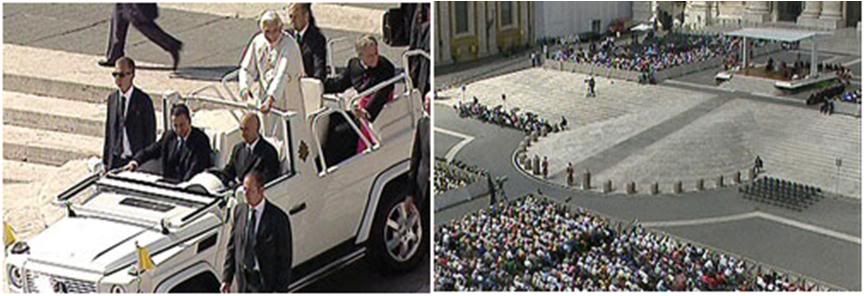
Pope Benedict XVI held his General Audience today in St. Peter's Square for the first time since the summer. He returned to Castel Gandolfo afterwards.
Here is how he summarized in English his catechesis today, which was a report on his trip to the Czech Republic on Sept. 26-28:
My Apostolic Journey to the Czech Republic last week-end was both a pilgrimage and a mission. It was a pilgrimage on account of the many saints who bore witness to Christ in the Czech lands through their holy lives, and it was a mission because, at the present time, Europe needs to rediscover the joy and hope that come from following the Lord Jesus.
I pray that our liturgical celebrations in Prague’s magnificent Cathedral, in Brno and in Stará Boleslav will have served to deepen the faith and enkindle the Christian commitment of the people of Central Europe, especially the young.
I am most grateful to the civil and ecclesiastical authorities in the Czech Republic who made me so welcome, especially to President Václav Klaus and Cardinal Miloslav Vlk.
I was glad to have the opportunity to meet leaders of other Christian communities and to encourage them in the task of ecumenical dialogue.
And it was a pleasure to come together with University Rectors and leading figures from the world of culture. I spoke with them of the need for scholarship to be rooted in truth, an integral truth that shuns the limitations of relativism and determinism.
I ask all of you to join me in praying that this visit may bear abundant spiritual fruit for the Czech people and for the unity and peace of the whole continent of Europe.
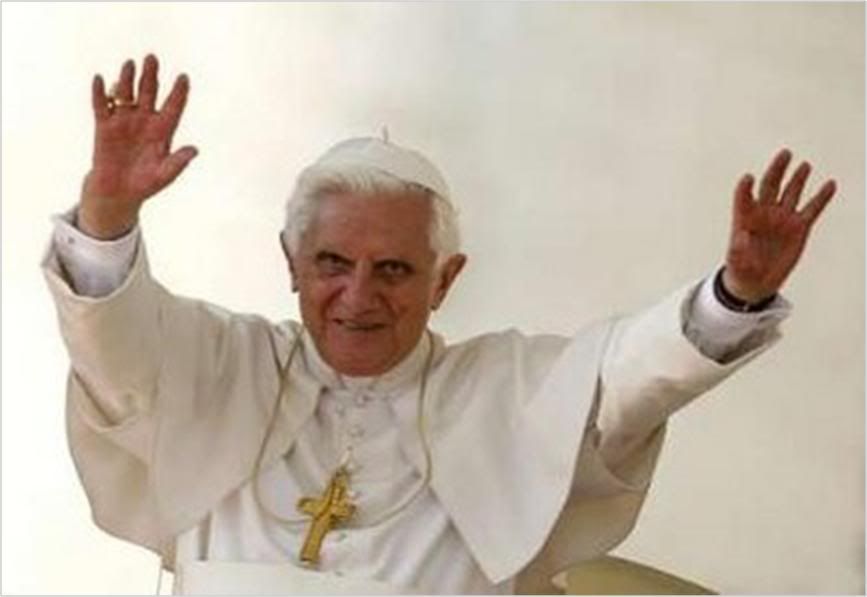
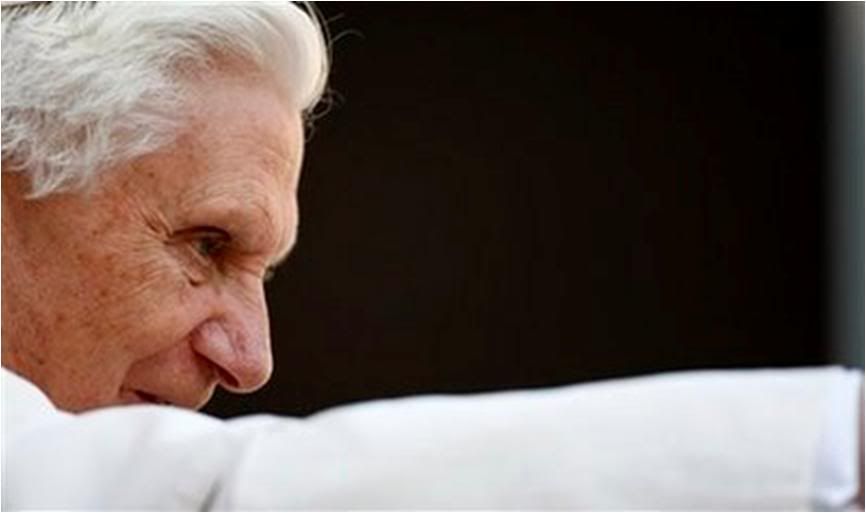
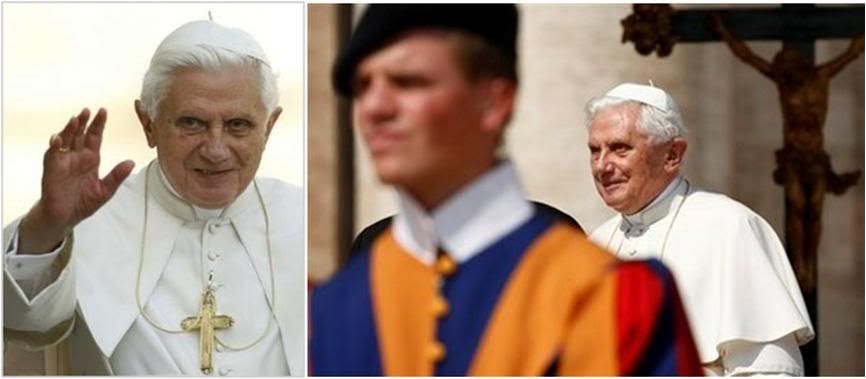 Here is a translation of the Holy Father's report on his trip to the Czech Republic:
Here is a translation of the Holy Father's report on his trip to the Czech Republic:
Dear brothers and sisters!
As usual after my international apostolic trips, I am availing of today's General Audience to speak of the pilgrimage that I made in recent days to the Czech Republic.
I do it, first of all, as an act of thanksgiving to God who has allowed me to make this visit which he has largely blessed. It was a true pilgrimage, and at the same time, a mission to the heart of Europe.
A pilgrimage, because Bohemia and Moravia have been for more than a millennium a land of faith and holiness. A mission, because Europe needs to rediscover in God and his love the firm foundation for hope.
It is not accidental that the evangelizing saints of those peoples, Cyril and Methodius, are patrons of Europe along with St. Benedict.
"The love of Christ is our strength": This was the theme of the visit, an affirmation that re-echoes the faith of so many heroic witnesses of the remote and recent past - I think in particular of the last century - but above all, it expresses the certainty of Christians today.
Yes, our strength is the love of Christ. A strength that inspires and animates true revolutions, peaceful and liberating, which sustains us in times of crisis, allowing us to rise again when freedom - so arduously recovered - risks losing truth itself.
The welcome that I received was heartfelt. The President of the Republic, to whom I renew the expression of my gratitude, was present at different occasions and received me and my co-workers in his residence, the historic Castle of Prague, with great cordiality.
The entire (Czech) bishops' conference, particularly the Cardinal Archbishop of Prague and the Bishop of Brno, made me feel, with great warmth, the profound link which unites the Czech Catholic community to the Successor of Peter. I also thank them for having prepared the liturgical celebrations with such great care,
I am thankful to all the civilian and military authorities and all those who, in various ways, cooperated for the success of my visit.
The love of Christ was first revealed in the face of a Child, Arriving in Prague, in fact, my first stop was at the Church of Our Lady of Victory where the Infant Jesus is venerated as 'the Infant of Prague'.
That image reminds us of the mystery of God made man, to the 'God with us', the foundation of our hope. Before the Infant of Prague, I prayed for all children and their parents, and for the future of the family. The true 'victory' that we ask of Mary today is the victory of love and life in the family and in society.
Prague Castle, which is extraordinary in its history and architecture, suggested a more general reflection; It encloses within its vast spaces multiple monuments, places and institutions, almost representing a 'polis', in which the Cathedral and the Palace, the public square and public gardens, coexist in harmony.
Thus, in that particular context, my visit touched both the civilian and religious spheres, not juxtaposed, but in harmonious closeness in their distinction.
Thus, addressing the political and civilian authorities and the diplomatic corps, I recalled the indissoluble link that should always exist between freedom and truth.
There is no need to fear the truth, because it is a friend to man and his freedom. Indeed, it is only in the sincere search for what is true, good and beautiful, that one can really offer a future to the young people today and to the generations to come.
Moreover, what is it that draws so many people to Prague but its beauty - a beauty that is not only aesthetic but also historical and religious, and human in the broadest sense?
Those who exercise authority in the political and educational fields must be able to draw from the light of truth which is the reflection of the Creator's eternal Wisdom - each one is called upon to bear witness to it personally in his own life.
Only serious commitment to intellectual and moral uprightness is worthy of the sacrifice made by those who paid dearly for freedom.
A symbol of the synthesis of truth and beauty is the splendid Cathedral of Prague, dedicated to Saints Vitus, Wenceslas and Adalbert, where Vespers was celebrated with priests, religious, seminarians and lay representative involved in various church associations and movements.
These are difficult times for the community of central and eastern Europe: The consequences of the long winter under atheistic totalitarianism have been amplified by the harmful effects of Western secularism and consumerism.
That is why I encouraged everyone to draw ever new energies from the risen Lord, in order to become evangelical yeast in society, and to engage, as they already have, in charitable activities, and even more, in educational and scholastic work.
This message of hope, based on faith in Christ, was addressed to the entire People of God in the two great Eucharistic celebrations that took place respectively in Brno, capital of Moravia, and in Stara Boleslav, the place of martyrdom of St. Wenceslas, the principal patron of the nation.
Moravia makes us think right away of Saints Cyril and Methodius, evangelizers of the Slav peoples, and therefore, of the inexhaustible power of the Gospel, which traverses history and continents like a river of healing waters, bringing life and salvation everywhere.
Above the portal of the Cathedral of Brno are the words of Christ: "Come to me, all you who labor and are burdened, and I will give you rest" (Mt 11,28).
These same words resounded last Sunday in the liturgy, reechoing the perennial voice of the Lord, hope of peoples - yesterday, today and always.
Eloquent message of the lordship of Christ, a lordship of grace and mercy, is the existence of the patrons of Christian nations like St. Wenceslas, a young Bohemian of the 10th century, who distinguished himself by his exemplary Christian testimony, and who was killed by his brother.
Wenceslas placed the kingdom of the heavens ahead of the fascination of earthly power and has remained forever in the hearts of the Czech people as a model and protector through the alternating currents of history.
To the many young people who were present at the Mass of St. Wenceslas, some of them coming from neigboring countries, I addressed the invitation to recognize in Christ their truest friend who satisfies the most profound aspirations of the human heart.
Finally I must mention two encounters among many: the ecumenical meeting and that with the academic community.
The first, held at the Archbishop's Palace of Prague, gathered together the leaders of the various Christian communities in the Czech Republic, and the leader of the Jewish community.
Thinking of the nation's history, which has unfortunately known harsh conflicts among Christians, it was cause for sincere gratitude to God to be together as disciples of the one Lord, to share the joy of the faith and our historical responsibility together in the face of present challenges.
The efforts to progress towards a unity that is increasingly full and visible among us, believers in Christ, makes stronger and more effective our common commitment towards the rediscovery of the Christian roots of Europe.
This last aspect, which was very dear to my beloved predecessor John Paul II, also emerged in the meeting with the rectors of Czech universities, representatives of professors and students, and other outstanding personalities in the cultural field.
In this context, I wished to underscore the role of the university as an institution, one of the fundamental structures of Europe, which has in Prague one of the oldest and most prestigious universities of the continent, Charles University, named after Emperor Charles IV who founded it along with Pope Clement VI.
The university is a vital environment in society, a guarantee of freedom and development, demonstrated by the fact that Prague's Velvet Revolution had its beginnings in university circles.
Twenty years since that historic event, I reproposed the idea of integral human formation, based on the unity of knowledge rooted in truth, in order to oppose a new dictatorship, that of relativism coupled with technological dominance.
Humanistic culture and scientific culture cnanot be separated - they are the two faces of the same coin, of which once again, we are reminded by this land, homeland of great writers like Kafka, and of the Abbot Mendel, pinoeer of modern genetics.
Dear friends, I thank the Lord because with this trip, he allowed me to meet a people and a Church with profound historical and religious roots,which this year commemorates various occasions of high spiritual and social significance.
To our brothers and sisters in the Czech Republic, I renew a message of hope and the invitation to have the courage to do good, to construct the present and the future of Europe.
I entrust the fruits of my pastoral visit to the intercession of the Most Blessed Mary and all the saints of Bohemia and Moravia. Thank you.
In his plurilingual greetings later, the Pope thanked the Poles and Slovaks for their prayers on his behalf during his trip to the Czech Republic. He told them to invoke the intercession of St. Wenceslas so that the trip may yield abundant spiritual fruits.
To the Czech pilgrims, he said: "Dearest ones, I still feel vividly the moments of emotion I experienced during my apostolic visit to your beautiful homeland where I received an affectionate welcome. I entrust the whole nation to the protection of St. Wenceslas and I bless you from the heart".
To Italian pilgrims, he had special words for the faithful from the diocese of Sulmona-Valva (in the region of L'Aquila), "who are here in great numbers with their bishop, Mons. Angelo Spina, in memory of St. Celestine V".
He added: "My brother has told me so many beautiful things about his visit to Sulmona".
[Mons. Georg Ratzinger, during his August stay at Castel Gandolfo with his brother, had taken a day trip to Sulmona, to revisit a World War II POW camp where he stayed for a few hours as a young German soldier returning to Germany from the Italian front in 1945.]
Among the Italian groups singled out by the Pope were participants of teh international conference "on the 50th anniversary of the death of the Servant of God don Luigi Sturzo".
[Sturzo, 1871-1959, was an activist priest considered to have been the father of modern Italian Christian Democratic politics. He wanted to introduce Catholic social doctrine into the Italian Socialist Party. A committed anti-fascist, he was exiled in 1924, returning only after the Second World War. He continued writing, this time turning his criticism on the post-war Christian Democrats of Italy but was not otherwise politicallly active. He was made a senator for life in 1953. The process for his beatification was started in 2001.]
Benedict XVI expressed the hope that "the luminous example of this priest and his testimony of love, freedom and service to the people may be a stimulus and encouragement for all Christians, especially those who work in in the social and political fields, so that they may, through their consistent testimony, spread the Gospel and the social doctrine of the Church".
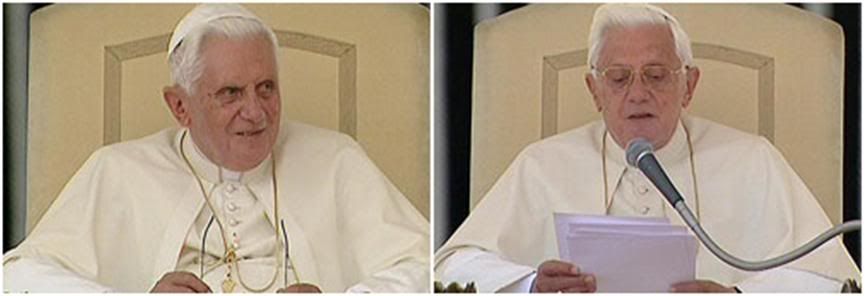
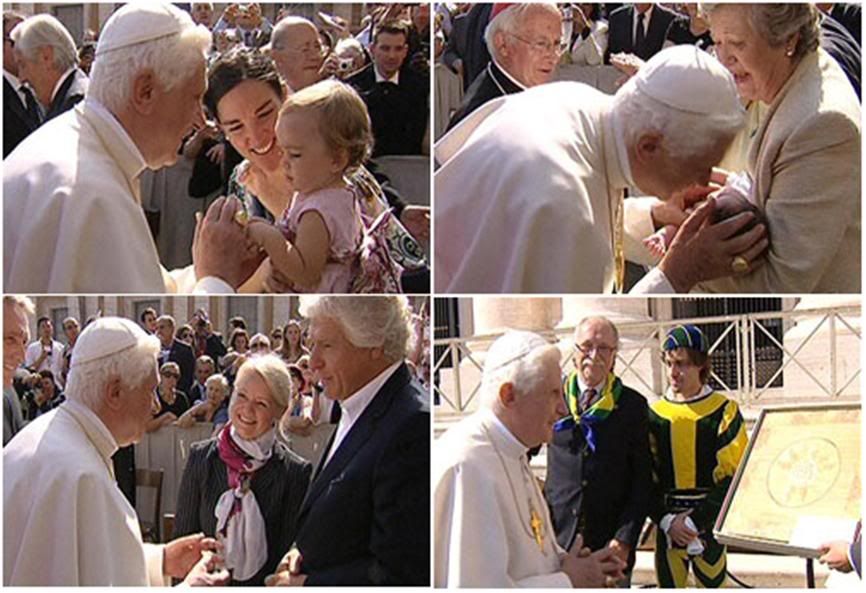
[Modificato da TERESA BENEDETTA 08/10/2009 01:18] |